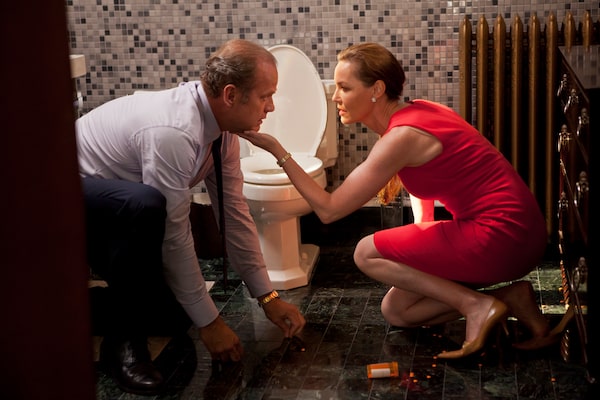
Boss (Crave) is brilliant, shockingly good TV. Kelsey Grammer, of all people, is monstrously good in the lead and after long years in comedy it gave him a career-defining dramatic role.Photo By: Chuck Hodes/crave
Listen, any one of you is well equipped to marshal the resources of Google and search for such lists as, “Best TV of the last 10 years.” You will find multiples lists with multiple mentions of the same classic series and a few more obscure titles.
Then you will begin the soul-destroying task of figuring out where those series can be found in Canada, if at all, and whether you have the service that provides them.
Today and not for the first time, this column offers you sure bets to save you time and bring succour. After scanning the archives and racking its brain – not an easy task in these desultory days – here are two undervalued classics of this Golden Age of TV, re-evaluated, and where to find them. Brace yourselves, one is gut-punch good and the other is an absolute joy.
Boss (Crave) is brilliant, shockingly good TV. It remains under the radar for several reasons. First it lasted two seasons, second it was made for the Starz channel, then just finding its feet, and third it was many months before it landed in Canada on Super Channel. It was nominated for several Golden Globes and had acquired one before it aired here.
The series is utterly and precisely focused on Chicago politics and it has a corrosive bleakness that’s very adult, very aware. Kelsey Grammer, of all people, is monstrously good in the lead and after long years in comedy it gave him a career-defining dramatic role.
From the foggy, grey Chicago scenes in the credits (Farhad Safinia wrote it and Gus Van Sant directed the first episodes) to the long opening scene, it’s clear this is storytelling with gravitas and a sense of menace about delivering the truth. In that long first scene Chicago Mayor Tom Kane (Grammer) is told at a secret meeting with a doctor he has a degenerative disorder that will have an impact on his physical and mental health. His grim face stares back, unflinching. The viewer senses this man is already sick, in the ways that addiction to political power makes men sick.
So Kane continues going about the daily business of running Chicago. We meet his icy wife (Connie Nielsen), who is as distant as she is cunning. We meet his top adviser (Martin Donovan), a man who shrugs at the most appalling of political actions. And there’s the mayor’s other adviser, Kitty (Canadian Kathleen Robertson, who is awesomely good and brave here), also icily steeled in ruthlessness. There are speeches to be made, favours to call in and machinations to further. Throughout, Tom Kane is a grim, reptilian godfather, always in control. What is particularly well done is the quiet tone, delivering a sense of the ordinariness of the awfulness of municipal politics.
There’s a scene in the first episode, which is breathtaking. Kane has been crossed by a trade-union group. He meets a union boss in his office, with advisers in attendance. There’s chat and, in an instant, he unleashes an attack on the union guy, so foul-mouthed, threatening and terrifying that viewers feel the fist-in-the-face impact. Boss is deeply impressive when grounded in this amphitheatre of political jeopardy, a living and convincing picture of politics as it plays out in grim reality.
The spirited intelligence of the writing is a thing to behold and while Grammer is monumental, he’s surrounded by outstanding performances. Donovan is great as the fixer devoted to his boss. Robertson, playing a role that requires a character’s self-loathing to surface often, is doing something that many actors would flee from in fear. A unique short-run series and Shakespearean at times in its acute treatment of power, vanity and lust.
Bleak House (BritBox) is the stunning, rapid-paced and teeming version of the Dickens novel made for BBC TV in 2005 and later shown on PBS Masterpiece.
Bleak House (BritBox) is the stunning, rapid-paced and teeming version of the Dickens novel made for BBC TV in 2005. The critics adored it and Gillian Anderson was singled out for her heartbreaking turn as the doomed Lady Dedlock.BBC/Mike Hogan
Adapted by veteran Andrew Davies as a fast-paced, thriller-like soap opera, it is instantly addictive. Davies adapted it as a 15-part series of 30-minute episodes. The episodes ran for several consecutive nights a week on the BBC, repeated together on Sundays. The idea was to mimic the cliffhanger-filled style of 24 and other serial dramas. Thus it unfolded on British TV much as Dickens had written it, and it worked superbly well. Millions watched it. The critics adored it and Gillian Anderson was singled out for her heartbreaking turn as the doomed Lady Dedlock.
The story teems with characters and incidents, but Lady Dedlock is at its still centre, often alone and palely loitering while ominous events accumulate around her. In the opening scene of what was the most lavishly praised period adaptation in years, she’s staring out a window. Her deadly dull husband asks if it’s still raining. She acknowledges that it is, and says, to no one, “And I am so bored.”
The viewer will never be bored; there’s a vastly complex legal case to be untangled, some characters will get very rich and others will get what they deserve for lining their pockets through other people’s misfortune.
Editor’s note: Based on information provided by BritBox Canada, an earlier version of this article incorrectly said BritBox offers a seven-day free trial. The service is not yet available in Amazon Prime Video Canada, but expects to be available on Amazon Prime Video in Canada soon.
Plan your screen time with the weekly What to Watch newsletter, with film, TV and streaming reviews and more. Sign up today.